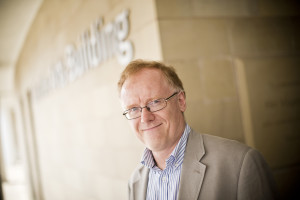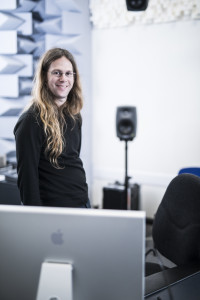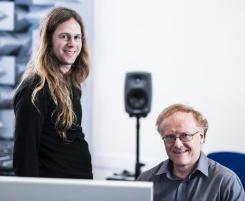Technology and Creativity in Electroacoustic Music
Technology plays an increasingly important role in the way music is created and disseminated. The majority of music heard today is mediated through digital technology of one form or another.
But has technology changed the creative possibilities open to composers? Or is it just the same music in a different medium? Can composers work in new ways and conceive their music differently because of the new technological opportunities available today?
The TaCEM project
The TaCEM project, Technology and Creativity in Electroacoustic Music, set out to examine these questions. This collaborative research project between the University of Huddersfield and Durham University was funded by a grant of £312,000 by the Arts and Humanities Research Council (AHRC) and ran for 30 months.
The project examined nine case studies in depth. These nine musical compositions, chosen as outstanding examples of composers deploying new digital technology to significant effect, have been studied in terms of their technical means, their musical context and through music analysis. As part of the project the researchers visited composers from the UK, Europe, USA and Canada in order to discuss works ranging from 1977 to 2013 and analyse the technology that inspired them.
Interactive aural techniques

A major part of the research has been the use of Interactive Aural techniques, previously pioneered by Principal Investigator Professor Michael Clarke in earlier projects. This approach uses software so that the investigation can be undertaken in terms of sound and by emulating the technologies used for the music.

Dr Frédéric Dufeu, Research Fellow at the University of Huddersfield, has worked on the project and has made major advances in the way such interactive software is designed. He has produced emulations of several systems crucial to the development of computer music but now obsolete, enabling their characteristics to be examined and their creative potential researched.
This particular research project had a sense of urgency, as many of the pioneer composers in this field are ageing and so is much of the technology they used. As early computers and synthesisers become obsolete or unobtainable, it becomes increasingly difficult to recapture the sounds and techniques that inspired creativity in the field up to three decades ago. The period covered started in the 1970s right through to the recent past.

In addition to the software dedicated to the individual case studies, generic software is being developed within the TaCEM project. TIAALS (Tools for Interactive Aural Analysis) enables the user to develop their own interactive aural analyses from the sound contents of any piece.
Co-investigator Professor Peter Manning from Durham University, a leading international expert on the history of electronic music and the technologies behind it, brought this expertise to the project.
International impact
The work has been presented at many of the major conferences in the field around the world, including in Athens, Berlin, Lisbon, London, Montreal, Paris and Perth in Australia. The work has been received with enthusiasm with many academics keen to use the software in their own teaching. The software is to be made freely available alongside a book Inside Computer Music to be published by Oxford University Press. Work is currently underway to complete the final case study for this publication.
Future work includes plans to develop the Interactive Aural approach to a wider repertoire of music including those aspects of acoustic music least suited to traditional notation and verbal description, for example, improvisation, world music and contemporary instrumental works.

Spotlight
Dr Frédéric Dufeu (left) and Professor Michael Clarke (right)
Professor Michael Clarke is Dean of the School of Music, Humanities and Media. He has worked at Huddersfield since 1987 and prior to taking up his current role had been Director of Research for the School since 2006 and then Dean of the University’s Graduate School in 2015-6. Michael’s research includes music composition, software development for music, and music analysis. Both his compositions and software have won national and international prizes, including winning European Academic Software Awards on a record three occasions. In 2011 he was awarded a National Teaching Fellowship. He was an assessor on Panel 35 in REF 2014. Dr Frédéric Dufeu joined the Centre for Research in New Music (CeReNeM) at the University of Huddersfield in 2012, as Research Assistant on the TaCEM project. As a musicologist willing to associate the analysis of music-making to a direct engagement with sound, he developed innovative software tools for the investigation of electroacoustic and computer music, following Michael Clarke’s approach of Interactive Aural Analysis. Now a Research Fellow, he is developing further research and software to facilitate the understanding of complex musical processes and, in turn, musical creation itself. To find out more about the research in this article please contact Professor Michael Clarke, email: j.m.clarke@hud.ac.uk or Dr Frédéric Dufeu, email: f.dufeu@hud.ac.uk
I am always conscious and proud of the fact that the University Enterprise Team was so supportive in my early stages, but what I have been most impressed with is that the support has continued long after I completed my studies and for that I am extremely grateful.
Allison Whitmarsh, Proper Maid
Winter 2016 Issue
Return to the home page for the Winter 2016 Issue of Discover.
Next article
Housing quality represents a key challenge in different areas across the world...